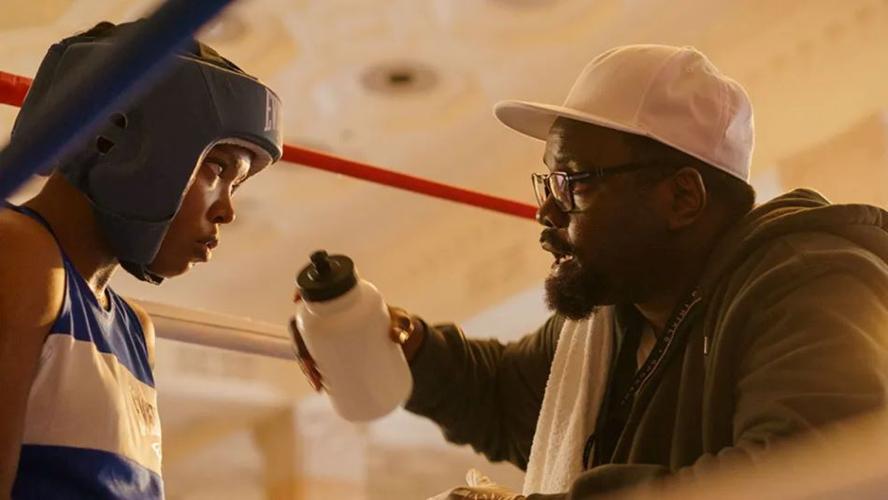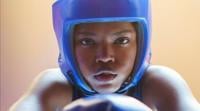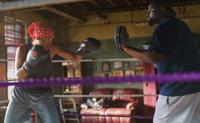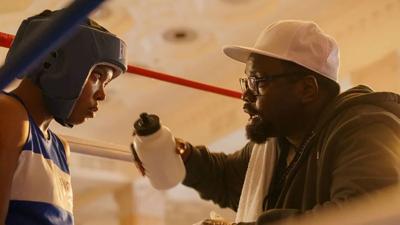Almost a decade ago, a documentary from Zackary Canepari and Drea Cooper called T-Rex (2016) was released and it was one of my favorite films of that year. The documentary was about Claressa Shields, the first woman in history to win a gold medal in Olympic boxing. It was also about her relationship with her coach, Jason Crutchfield. Rachel Morrison is more known for being the cinematographer for films such as Black Panther (2018) and Mudbound (2017). The latter of which got her an Oscar nomination. Barry Jenkins is the Oscar-winning filmmaker of Moonlight (2016). Jenkins was hired to adapt T-Rex into a feature film. Morrison was then tapped to direct it. The film has been in development Hell for some years. It's ironic that Jenkins' Mufasa: The Lion King (2024) would be released the week before this one.
In my review for T-Rex, I made comparisons to Creed (2015), a film in the Rocky franchise that instead focuses on a young African American aspiring to become a boxer, and to Race (2016), which was about an African American struggling to get to the Olympics, as well as the struggles afterward. Jenkins' adaptation continues those comparisons, but now it's more centered around a female perspective. However, as I watched this version of the story, what eventually came to mind, as the best comparison, is King Richard (2021). That film centered around a female athlete, specifically Venus Williams, and her father who was essentially her coach and manager, as well as the path of her career.

Ryan Destiny (Grown-ish and Star) plays Claressa Shields, a teenage Black girl living in Flint, Michigan. In 2006, at the age of 11, she began training at a boxing gym called Berston. Her father who was in prison during her childhood was a boxer also. Her father introduced her to the sport, much in the way that Venus' father did and he mentored her, but because Claressa's father was in prison, she needed another mentor and potential father figure.
Brian Tyree Henry (Godzilla vs. Kong and Atlanta) co-stars as Jason Crutchfield, one of the boxing coaches at Berston. When most don't want a girl training along side them, Jason decides to train her and give her a chance because he recognizes something in her that he thinks makes her a good boxer. He refers to it by the titular phrase. Like with a lot of the young people that he trains in Flint, he sees the poverty and that a lot of these children come from broken homes or homes that are struggling financially. Instead of having them on the streets, he feels obligated to bring them in and try to help in any way that he can. He's not exactly like Venus' father in King Richard, but he certainly becomes synonymous.

Now, obviously, Venus Williams is a popular name that is widely known. She's a celebrity and her fame is global at this point. The name Claressa Shields isn't as famous and isn't as worldwide. It's unlikely that a lot of people even saw her documentary T-Rex, which at this point is nearly a decade old. Needless to say, there is a reason why. The reason why Claressa isn't a household name or more known to general audiences is because unlike Venus Williams, Claressa didn't get the endorsements deals, which have put her name and face out there in the mass media, in terms of being on cereal boxes or in TV commercials.
In my review for T-Rex, I also made comparisons to Matthew Cherry's The Last Fall (2013), which is about this idea that even if you make a big achievement in sports, it doesn't mean that you're going to become rich and famous. There are plenty of athletes in pro sports or have gone to the Olympics and won gold medals whom most people don't know and probably will never know. Throw on top of it the sexism when it comes to how women in sports are perceived, despite having better records. This film addresses that.

Even though I enjoyed King Richard, that film was purposefully weighted toward the father character, played by Will Smith who won the Oscar for it. I would say that this film is more balanced in that it puts us more into the head and the shoes of the female athlete than even King Richard did. I think this film gives the female athlete more of an ideological position than the character of Venus Williams in King Richard. The character of Venus Williams didn't have to struggle in the way that Claressa does. The financial difficulties that Claressa faces are more extreme and her situation is way more desperate, so that gives Claressa a more understandable point of view. It makes her scenes where she's arguing with her coach Jason all that more impactful. It also helps that we feel the genuine love and caring between the two.
Rated PG-13 for some strong language and brief suggestive material.
Running Time: 1 hr. and 49 mins.
In theaters.












